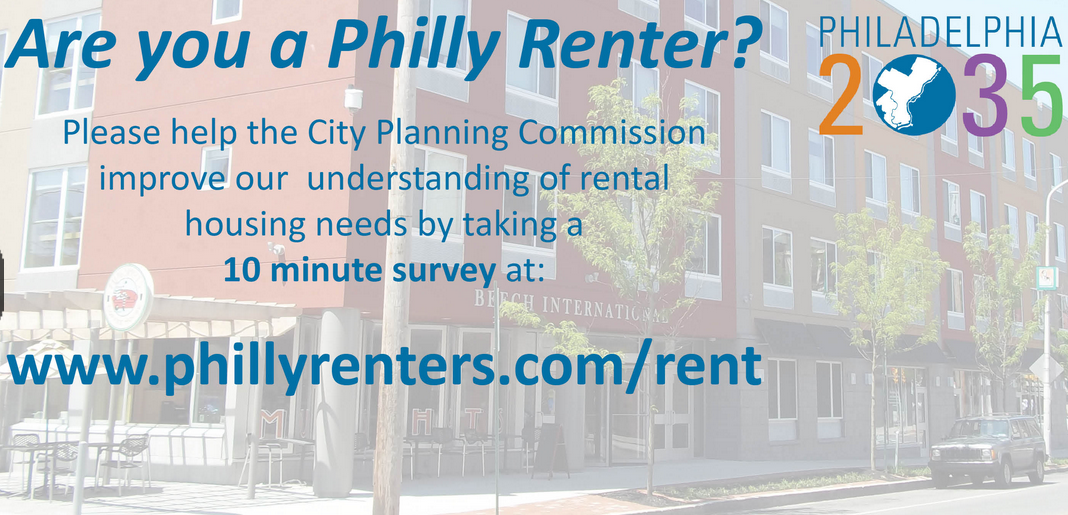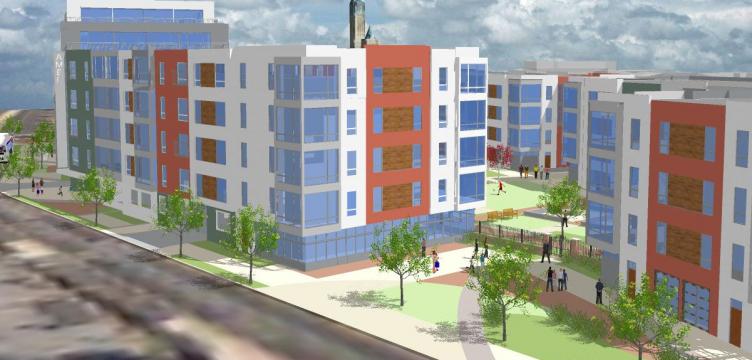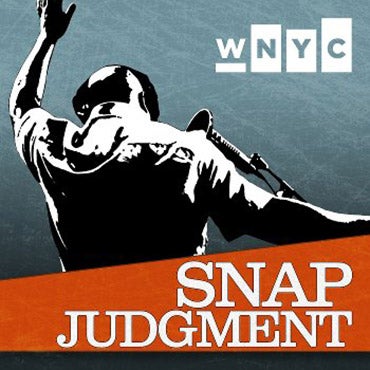Why city planners are surveying city renters

Realizing they don’t know enough about Philadelphians who rent and the rental experience here, city planners have launched a renters survey.
City Planner Octavia N. Howell, who is overseeing the project, said planners realized “our information on renters is less robust than we would like it to be” when compiling information on existing neighborhood conditions for the district-level comprehensive plans.
Renters can take the survey here.
Traditionally, Howell said, urban planners have believed that renters are a transient population who remain uninvested in their communities. Planners have also largely assumed that people rent because they can’t afford to buy.
“Some of us are challenging that,” Howell said in a recent interview. “We think people are choosing renting as an alternative to home ownership, and that some are permanent residents in their neighborhood.”
Christine Young-Gertz, governmental affairs director of the Apartment Association of Greater Philadelphia, agrees with that assessment.
“The fastest-growing segment of apartment customers are renters by choice, and the fastest-growing group within that group are empty nesters,” said Young-Gertz, whose organization represents mostly apartment communities.
The city planning renter’s survey, which runs through mid-July, asks renters not only why they rent and what their experiences have been like, but whether they find renting in Philadelphia affordable. Howell said the hope is that responses will come in from across the city, because it is likely that the answers depend largely on neighborhood conditions.
City Planning is also reaching out to people on the other side of the rental agreement. Howell said the landlords won’t get their own survey, they will be interviewed.
Howell said she is personally interested in learning how houses go from owner-occupied to rental units. Is it because the owners want to rent the property to make money? Or is it because they can’t sell the house, or sell it for the price they hoped for? “We’d like to know the extent to which people are landlords by choice,” she said.
Harvey Spear is president of the Homeowners Association of Philadelphia, a membership organization of landlords. Their rentals cover the gamut from luxury units to low-income, Spear said. He owns 35 brownstone buildings containing 300 apartments.
Spear said people are becoming landlords because there is “definitely a demand. There is an increased number of people renting.”
Many people no longer see owning a home as a guaranteed investment, he said. So they rent, and invest their money elsewhere.
Phil Lord, executive director of the Tenant Union Representative Network, a renters-rights organization that organizes tenants and offers assistance to low-income tenants, is one of those renters-by-choice. Prior to 1996, Lord owned a home with space for his mom to live with his family. When circumstances changed, the house was too big, said Lord, an attorney who was then in private practice, handling real estate work. He and his wife rented a smaller townhouse in Chestnut Hill. “The truth is, we planned to buy later on,” he said. But his family liked the neighborhood, and figured, “why move somewhere else that is not as nice, just to have a (real estate) investment?”
But, Lord said, there are many people who are renting because they can’t afford to buy, or for other financial reasons. “Renting in any major city right now is more of an issue because of this whole foreclosure and economic crises thing,” he said.
The number of tenants in Philadelphia has for years hovered around 38 to 41 percent of the population, but recent census data puts that at 46 percent, Lord said. According to the latest census reporting, there are 311,303 owner-occupied housing units in Philadelphia and 265,126 renter-occupied units.
The financial crisis has changed renting in another way, Lord said: A huge number of tenant evictions nationwide stem from the foreclosure of the landlord’s property. “There are a lot of situations where the renters are paying rent, but it’s not going to the mortgage company,” he said.
Within Lord’s own staff are other owners-turned renters, each with their own reasons for the change:
-Tenant organizer Albert Seawright, who has rented in Wynnefield for two years, has mostly rented since 1970. He owned a home for 10 years, but returned to renting for the freedom and cost savings. “I don’t like shoveling snow, cutting grass, or raking leaves in the fall,” he said. “And I actually feel that the cost of homeownership is more expensive than renting, especially if you own the older homes, which most houses in Philadelphia are. Every 15 years the systems need to be replaced and the roof, and the (old) windows.” He has no plans to own again.
-Housing placement specialist Maureen Saltarelli sold her Mayfair home six years ago, when she felt decreasing housing values might leave her underwater financially. She rented a place in Mayfair, and then moved to Torresdale so her daughter could attend a different school. A year ago, she moved to Bensalem, again with her 13-year-old daughter’s education in mind. She likes the flexibility of renting – when her daughter finishes school, she may move out of the area.
-Housing stabilization specialist Valerie Waters sold her suburban home after ending a marriage. She thought renting would make it harder for her ex to find her, and she moved to Philadelphia to be closer to her work. Her divorce now final, she hopes to own a home again in the future – mostly because she wants a big yard, a garage, and pets, but also because her rent keeps going up, and the uncertainty makes budgeting difficult.
Reyna Howkins, a web content coordinator for the American College of Physicians who lives in the Fishtown/Kensington/Port Richmond area, has mostly been a renter since 1997. She owned from 2002 to 2004, but sold after a divorce.
She’s enjoyed the flexibility of renting, but Howkins is moving back with her parents to save money to buy again, either in Fishtown or South Philly. “It got to the point where if I’m paying $1,100 a month, I could have my own house,” she said.
What could the city do to improve the renting experience?
Howkins said most of her rentals, including her current house, have been nice places, and her landlords good people. The worst problems have been with the roommates she took on by necessity, at times when she couldn’t pay the rent herself, she said.
But early in her renting career, Howkins had heat that didn’t work, and wasn’t certain what to do about it. “It felt like you didn’t have much recourse,” she said. “I didn’t know what the proper channels would be to try to get that resolved more quickly, and you feel like you are at their mercy.”
Howkins said she eventually got the problem resolved – she thinks she called License & Inspections – but said the city should have more information to renters about what they can do if their landlords are failing them.
Lord said there is a city program, recently reinstated after a legal challenge, that requires city landlords to provide new tenants with a copy of their license, and provide them with a handbook describing steps the tenant can take if conditions don’t meet the license requirement.
Saltarelli said when she moved to Bucks County, there was an inspection before move-in to make sure everything was in working order. It made her feel very secure about her new place, and she’d like to see something like that required for private rentals in Philadelphia.
Waters said Philadelphia needs some sort of rent stabilization program.
Lord said the city needs more L&I inspectors, which would allow for more pro-active inspections. Inspections are now done on a complaint basis, he said.
The building owner association representatives believe the city should have fewer regulations and lower taxes, both of which dissuade would-be landlords or make them leave the business.
AVI is a huge concern for landlords, said Spear, who is also vice-chair of the Old City District. Higher taxes are often passed on to renters, but landlords who provide low-income housing often can’t raise the rent and keep their tenants, he said. As the margins become thinner, there is less incentive to rent, particularly at lower rates.
Extending the 10-year tax abatement program would also encourage the building of rental units, he said.
Saltarelli said it may be difficult for non-professionals to find low-income housing, but she can generally find two or three options for each client.
Lord said the availability varies greatly by neighborhood, however. And the more gentrified and/or popular a neighborhood becomes, the less likely it is to find low-income housing. The city could help by offering loans or other assistance to landlords who want to offer this type of housing, he said.
Tenants and landlords had the same response when asked if renters are active in their communities: Some of them. Some of the time. Spear said he rents a lot to medical and law school students who are very busy, and here for a few years, but then move on. They are typically not active. But those who stay long term are very active in the community. Seawright said he’s not become that active in Wynnefield, but was in Germantown, where he lived previously.
“I was a member of Friends of Vernon Park – a treehugger, who trimmed the trees and helped take care of the park,” he said.
The Melior Group, city planning’s consultant on this project, will be questioning landlords taken from L&I’s list of licensed landlords in the city. The entire project costs a little less than $20,000, Howell said. The money came from the Mayor’s Fund for Philadelphia.
Everything, including analysis, should be finished by August, Howell said. The hope is the information will show planners how to improve renters’ experience in Philadelphia.
Survey results won’t be used to change goals of the handful of district plans that are already finished, Howell said. But they will inform future district plans. And since the city-wide comprehensive plan and the district-level plans will all be updated on a regular schedule, the results will be used everywhere, eventually.

WHYY is your source for fact-based, in-depth journalism and information. As a nonprofit organization, we rely on financial support from readers like you. Please give today.




